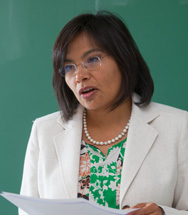The group of research in Recent History organizes a seminar on politics and religion in Mexico.
lecture María Teresa Enríquez, professor at Philosophy of the Universidad Panamericana, position .

On April 27, María Teresa Enríquez, professor of Philosophy at the Universidad Panamericana (campus of Aguascalientes, Mexico), presented at the seminar organized by the group of research in Recent History(GIHRE) a historical synthesis on the relationship between politics and religion in the history of Mexico, from the conquest to the present day. With this project in mind, Enriquez proposed a series of interpretative keys to the main milestones in the history of Catholicism in Mexico.
Of the colonial period, the most important aspects were the evangelization process and the contacts with pre-Christian religions, with the social and cultural implications that it also brought with it, the phenomenon of the Marian cult of the Virgin of Guadalupe and the deep imprint of the institution of the royal board of trustees in the configuration of the relationship between the Church and political power.
He then developed the main themes present in the genesis of the conflict between religion and political power in independent Mexico in the 19th century: the training of an anticlericalism that, although coherent with a broader current common to other Latin countries with a Catholic tradition, acquired in that country an undoubtedly distinctive personality of its own; the fundamental milestones of the Reform Laws of Juarez, in the fifties and sixties, preceded a couple of decades earlier by the so-called "Prerreforma" of Gomez Farias; as well as, finally, the prolonged Porfiriato, which, without repealing the liberal laws, allowed a B recovery of religious life.
The narrative proposal by Professor Enriquez leads, in this way, to the main argumentative core of the religious conflict in contemporary Mexico, which is undoubtedly the anticlerical climax that opens from the Revolution of 1917, with the great persecutions of the twenties and the Cristero wars.
The last interpretative keys deal, naturally, with the present time, in which it is possible to observe a double process. On the one hand, the democratizing evolution of the PRI regime also brought with it a withdrawal of the restrictions to religious freedom of official anticlericalism, but on the other hand, Mexico is no stranger to the "culture wars" characteristic of this beginning of the 21st century.





